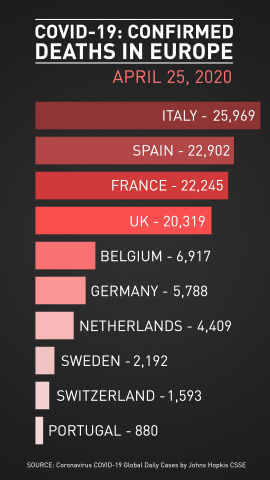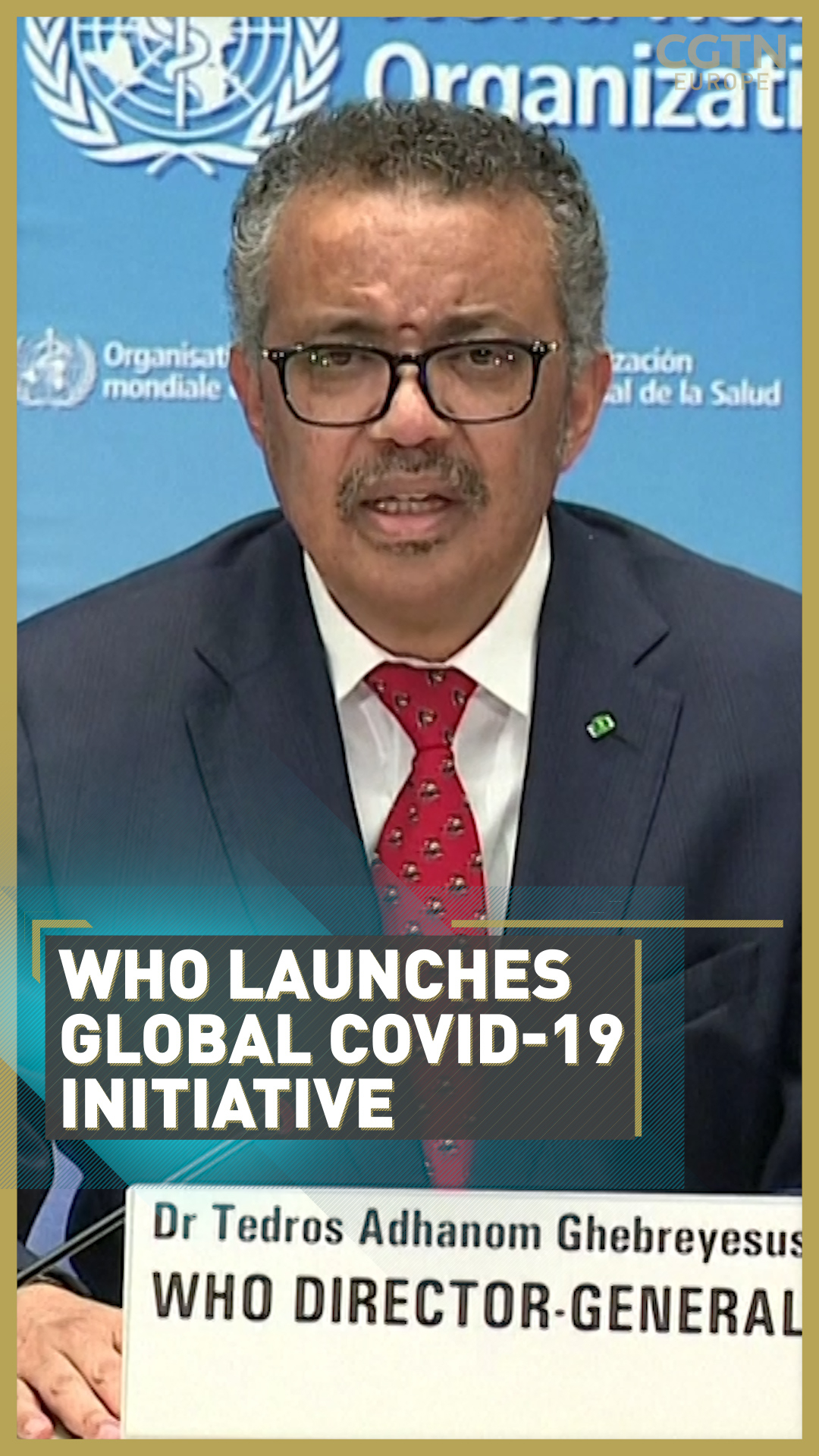TOP HEADLINES
- The French military buys the anti-malarial drug chloroquine from China as a precaution in case it becomes an approved medication for the coronavirus.
- The UK crosses the grim milestone of 20,000 COVID-19 deaths recorded in hospitals with Home Secretary Priti Patel calling the development a "deeply tragic and moving moment".
- Hundreds of Polish workers in Germany held a protest in the border town of Zgorzelec over the imposition of a two-week lockdown to stop people entering its territory.
- Belgium is set for a gradual easing of restriction measures from 4 May, followed by phases of further re-opening during next month.
- Poland's health minister sought a delay of the presidential election scheduled for 10 May, saying that a two-year postponement should be considered in light of the disease.
- British Airways ramps up cargo-only flights from China to ferry essential supplies including personal protective equipment and ventilators for the National Health Service.
- Air France-KLM receives $7.42 billion in aid from the French government as commercial aviation almost grinds to a halt due to the virus.
- UK insurers are likely to pay more than $1.5 billion on claims from businesses and individuals affected by the pandemic, an insurance trade body warned.
- A French court has dismissed an appeal from Amazon against a ruling that specifies what the e-commerce giant can deliver during the outbreak.
- Merlin Entertainments, the owner of Madame Tussauds, raises $530 million via a five-year bond sale to secure funds to help it weather the coronavirus.
00:10

ACROSS EUROPE
Spain
Spain reported its lowest 24-hour death toll for more than a month as the authorities confirmed that the 'toughest phase' of the outbreak was over in one of the worst-affected countries in Europe.
The number of people who have died of COVID-19 in Spain now stands at 22,524. Confirmed cases total 219,764.
Government spokesperson Maria Jesus Montero said: "We have indeed overcome the toughest phase, the most critical phase of the disease, thanks mainly to the effort of the whole Spanish society."

British Airways has increased cargo-only flights from China to ferry essential medical supplies to the UK. /British Airways
British Airways has increased cargo-only flights from China to ferry essential medical supplies to the UK. /British Airways
Italy
The first COVID-19 infections in Italy may have appeared in January, a report has claimed. It had previously been thought that the first transmission in Italy was in mid-February.
In a news conference with the country's health authorities, Stefano Merler of the Bruno Kessler Foundation said that his institute investigated the first-known cases and was able to retrace how the virus spread.
"We realised that there were a lot of infected people in Lombardy well before 20 February, which means the epidemic had started much earlier," he said. "In January for sure, but maybe even before. We'll never know."
The Italian government started widely testing people from 21 February after a case in the town of Codogno in the northern Lombardy region.
02:27

Nicole Johnston in London
While the UK's National Health Service has not yet breached its capacity to deal with cases, there's growing concern that people who are suffering from other illnesses are not getting medical treatment.
There has been a 50 percent fall in people attending accident and emergency services. Public Health England PHE is particularly urging anyone who has a sick child or is worried they've suffered from a heart attack or stroke to seek treatment immediately.
Meanwhile the government is under fire for not revealing who is on its expert scientific advisory committee called SAGE. Prime Minister Boris Johnson's chief political adviser Dominic Cummings is reported to have attended the meetings, which has raised concern about political influence over scientific advice.
The government is still struggling to increase its antigen testing to find out who has COVID-19. It set a target of 100,000 per day by the end of April, but is still far below this figure.
Natalie Carney in Munich
While the "easing" of restrictions on public life has begun, Germany is already preparing for a second wave of COVID-19.
All 16 states have agreed to make masks compulsory, and Berlin's Messe exhibition center is being converted into a 1,000-bed hospital to expand capacity in case of a surge in infections.
Yet many Germans appear to be heeding Chancellor Angela Merkel's warning that "we must remain vigilant and disciplined," and that "we are not in the final phase of this pandemic: we're just at the beginning."
Many shops may have reopened their doors but the public seems reluctant, be that for health or financial reasons.
Merkel and the 16 state premiers are expected to discuss further easing on Thursday, yet the country's center for disease control has advised that first, the number of confirmed cases needs to fall to a few hundred per day.
Subscribe here to get the COVID-19 Europe bulletin sent directly to your inbox.
FROM OUR GLOBAL COLLEAGUES
- Trump vows to send ventilators to Latin America, Asia
- Morocco imposes month-long curfew as the coronavirus cases soar
- COVID-19 Global Roundup: Latest pandemic measures
CGTN Europe has been providing in-depth coverage of the novel coronavirus story as it has unfolded. Here you can read the essential information about the crisis.